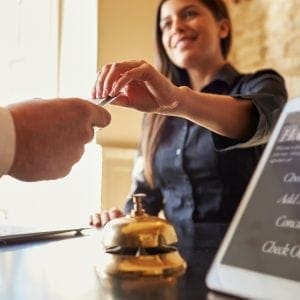 Maintaining and generating guest loyalty is a greater hardship for hotels than ever before. The proliferation of online travel agencies (OTAs), review sites and social media commentary all influence the modern consumer’s booking decision. With so many accommodation choices and peer-reviewed content to consume, attracting a return guest can be a real challenge.
Maintaining and generating guest loyalty is a greater hardship for hotels than ever before. The proliferation of online travel agencies (OTAs), review sites and social media commentary all influence the modern consumer’s booking decision. With so many accommodation choices and peer-reviewed content to consume, attracting a return guest can be a real challenge.
To continue building loyalty with the hotel guests of today, you must know your customerÑwhat do they want and what can you deliver? Sounds simple, right? If only.
Currently, the choice of solutions available for a variety of guest scenarios and/or preferences can appear overwhelming. For instance, younger guests may prefer not to interact with anyone at check-in or wait in line. For these guests, there are mobile apps, keyless entry and secure payment options. However, just because one traveller wishes to streamline their check-in experience doesn’t mean every traveller wants to avoid personal service. An automated chatbot might recite breakfast hours or the daily in-room dining specials, but when a guest is looking for a unique brunch experience, they want to speak with a human. This means hotels need to ensure they cater to a wide range of guest types and preferences. But is it feasible, or even good practice, to try and meet the needs of every possible guest? How should hoteliers meet the needs of guests and encourage loyalty now and into the future?Ê
What worked yesterday may not today
Historically, loyalty was thought to be best accomplished by allowing people to earn points for stays (and other ancillary spends) and letting them trade-in these points for complimentary hotel stays. It is questionable, however, if this mechanism drives loyalty to the brand or if it instead drives spending for the company offering the most points (or now best points/credit card offers). With Marriott and other large brands now commanding ÒloyaltyÓ by millions of travellersÑmany of them being members of multiple programsÑdo guests even care? Are digitally savvy guests no longer swayed by their loyalty points and instead drawn in by the instant gratification of an online-sale offered by a rival property?
Hoteliers themselves recognise the challenges around the traditional loyalty model and are increasingly referring to schemes, and frequency or reward programs, that are less about loyalty and more about rewarding guests with points or discounts. Regardless of what guise a hotel’s loyalty or reward program may take, one thing hoteliers need to remember is that credit points or a discount may get a guest in the door, but does not necessarily deliver guest loyalty.
Rather than relying on loyalty programs, hotels need to humanise the guest experience. Strong considerations for the marketing strategy, booking experience and stay experience need to be made. When a new guest decides to stay with a hotel, the entire life-cycle of opportunity emerges to interact, learn and, in turn, convert that guest into a loyal customerÑwhether they booked direct or through a third party, on a discount or at a premium rate.
To encourage loyalty and limit the impact of guests’ rate-shopping online, many hotel brands have also implemented programmes that deliver discounted rates for direct bookings of loyalty members. Hilton successfully runs a multi-platform campaign to re-educate consumers to book direct, called ‘Stop Clicking Around.’ The ‘Stop Clicking Around’ program means that booking direct is more beneficial than venturing to OTAs for bookings, as Hilton offers exclusive discounted rates on rooms, in addition to exclusive benefits for members of the Hilton Honors programme.
Meeting the needs of your market
The first step in building brand loyalty with guests is actually getting people to stay at your property. Hotels looking to attract the guest of tomorrow need to ensure they understand the value perception of their hotel amongst key demographics and ensure their property is priced correctly considering the competition.
Many hoteliers hope to attract more millennial travellers, a booking segment that is only going to grow in importance over coming years. With the key competitor for this segment being Airbnb, properties keen to attract guests from this demographic could improve their online presence and offer accommodation deals that appeal directly to this segment. Hotel packages should be developed that speak to millennials who base their travels more around experiences than just destinations, including a combination of rooms with food and beverage vouchers or entertainment tickets.
Additionally, millennial guests are more likely to value authenticity over big brand experiences. They want to experience the local way of life, not be cut-off from it in a generic five-star property. This means that hoteliers looking to attract business from this demographic need to diversify their offerings, which may explain why there has been a proliferation of brands by the big global hotel groups recently. Marriott has close to 30 brands and Accor has grown its portfolio from 13 hotel brands only a few years ago to 25 today. Accor’s acquisition of Mama Shelter, IHG’s acquisition of Kimpton and the launch of Hotel Indigo are all signs the large hotel groups are attempting to cater to unique, sometimes niche needs. Hoteliers are beginning to understand that customers want more choice and are moving away from chains that offer only cookie-cutter experiences.
The future of hotel loyalty
Increasingly, it will be those hoteliers that understand consumer trends and best cater to these changing needs of guests that will be best positioned to attract and retain the guest of the future. Hoteliers need to appreciate that consumers are no longer looking to purchase just products or brands. They are looking to buy experiences which can be shared. The guest of the future won’t search for a room or a hotel, or a hotel brand. Rather they will look to stay in unique, authentic properties (including apartments) that offer tailored experiences.
A major threat to hotel and lodging guest loyalty is already on the horizon, with Airbnb set to introduce their own loyalty scheme for frequent users. Conceivably, these frequent bookers of Airbnb would have only a few years ago been highly valued members of hotel loyalty schemes themselves. Soon, they will be actively encouraged and rewarded to spend their future travels staying within the Airbnb ecosystem, making it even harder to entice these guests back to traditional hotels.
Going forward, loyalty will be achieved by hoteliers who can best understand consumer needs, attract them to their property and offer them the rewarding experience they desire. Just look at Rosewood HotelsÑthey don’t even have a loyalty program for guests because they know their properties offer unique, personalised experiences, which is enough of a pull to bring guests back time and again.
Don’t forget to listen to what your guests are saying
Hoteliers that monitor what is being said about their property online (and acting upon it where appropriate) are positioned to best understand the concerns or compliments of guests in the future. For example, if the common feedback on social media is that the hotel’s Wi-Fi is dysfunctional, the IT department at the hotel could investigate and rectify any issues to prevent negative guest experiences and subsequent damaging online commentary. In the same way, if a hotel is rated highly and the majority of social media commentary relates to the tastefully decorated rooms and comfortable beds, the marketing department will have the opportunity to build on these positive reviews to encourage return customers.
The next wave of hotel technology transformation will see hoteliers able to anticipate guest needs or potential issues proactively, instead of having to wait for guests to ask for a service, or worse, complain about an aspect of their stay being unsatisfactory. Advanced artificial intelligence platforms will be able to understand what customers want before they want it and provide recommendations to enhance the guest experience.
A good guest experience can help build loyalty
The importance of loyalty in the hotel sector can’t be underestimated in an increasingly competitive, digitally focused booking environment. It is more cost effective to attract repeat business than it is to bring in new business, and it stands to reason that a satisfied guest is much more likely to come back if they leave a happy customer. Hoteliers need to ensure they create the right experiences for guests and focus on value rather than price to attract and retain guests now and into the future.
About the author
 Klaus Kohlmayr is the Chief Evangelist of IDeaS Revenue Solutions.ÊAs IDeaS Chief Evangelist, Klaus Kohlmayr challenges strategic processes, stimulates thought-provoking conversations and reinvigorates the future of revenue management and pricing within the hospitality and travel industries.
Klaus Kohlmayr is the Chief Evangelist of IDeaS Revenue Solutions.ÊAs IDeaS Chief Evangelist, Klaus Kohlmayr challenges strategic processes, stimulates thought-provoking conversations and reinvigorates the future of revenue management and pricing within the hospitality and travel industries.















